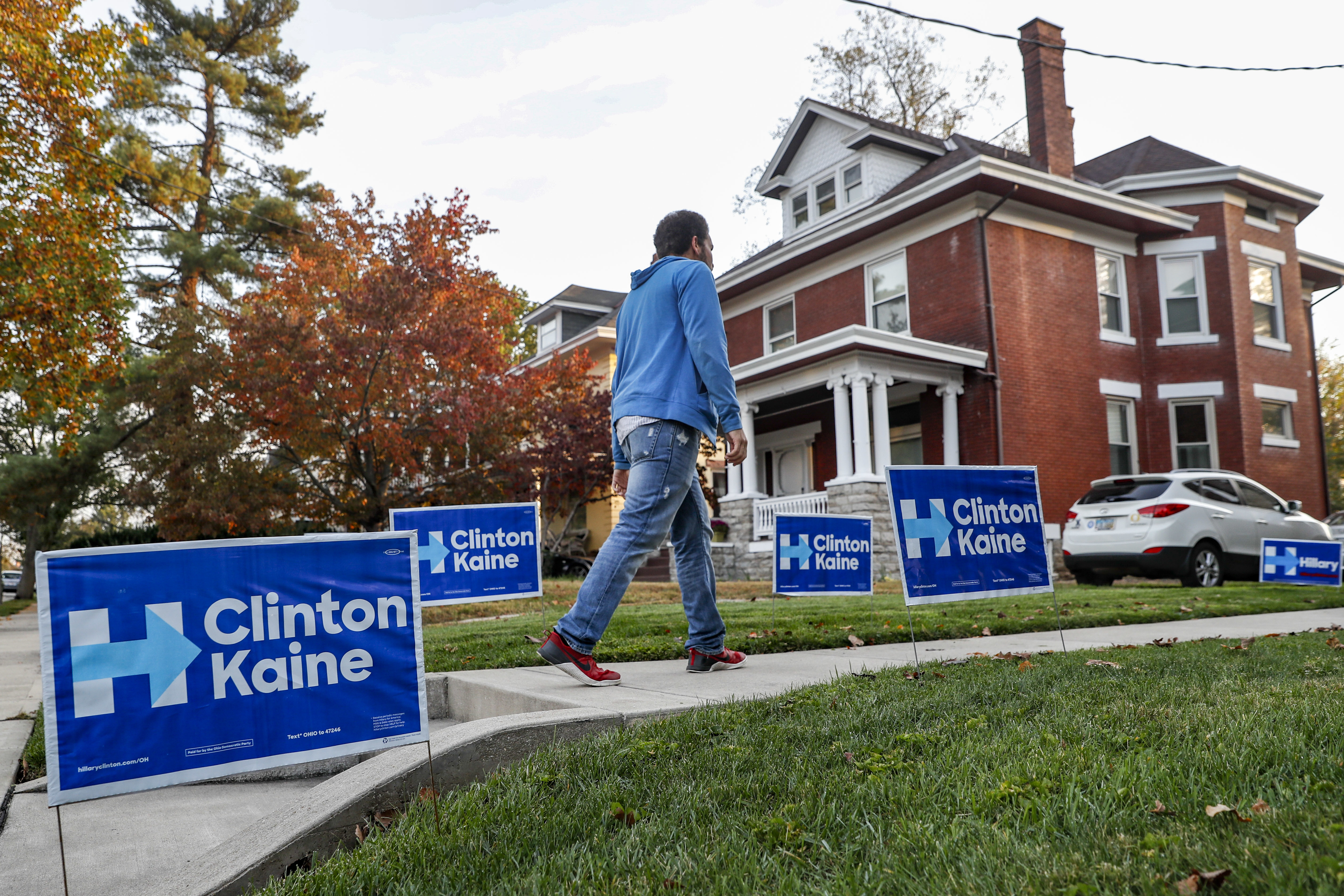The tyranny of campaign signs
If you have a campaign ad stuck in your lawn, throw it away immediately


A free daily email with the biggest news stories of the day – and the best features from TheWeek.com
You are now subscribed
Your newsletter sign-up was successful
This election, some very rich people have made some very big offers for elusive materials. LinkedIn co-founder Reid Hoffman said he would donate as much as $5 million to veterans if Donald Trump released his taxes before the final presidential debate. Larry Flynt promised to pay up to $1 million to anyone who comes forward with a "scandalous" tape starring Trump.
I, too, am on the hunt for my own white whale: Any person registered to vote in the United States of America who has chosen a candidate based purely on a campaign sign.
While I can't tempt you with the same bounty as Flynt or Hoffman (the best I can do is my leftover Halloween candy, but we did buy the good stuff: Snickers and Reese's Peanut Butter Cups), I don't think it really matters, because I'm confident that no one will ever step forward. Think about it: Has anyone ever told you they were set on voting for Candidate A, but saw a sign for Candidate B and suddenly changed their mind?
The Week
Escape your echo chamber. Get the facts behind the news, plus analysis from multiple perspectives.

Sign up for The Week's Free Newsletters
From our morning news briefing to a weekly Good News Newsletter, get the best of The Week delivered directly to your inbox.
From our morning news briefing to a weekly Good News Newsletter, get the best of The Week delivered directly to your inbox.
Of course not. So really, what is the point of campaign signs?
Maybe you think campaign signs spread the name of a candidate, and might get a few people to Google them if they can remember the proper spelling. But that's the best case. Lawn signs don't offer any insight into the candidate's policy views. They don't help your neighbors learn where a candidate stands on the issues. And the signs rarely even state the person's political party. These political eyesores don't relay any information that responsible voters require when it comes time to choosing a candidate.
So what are they good for? A few things: Littering public spaces, keeping Staples and Office Depot in business, and making you hate your neighbors.
Campaign signs cluttering empty lots and fences are bad enough, but it's so much worse when they infiltrate where you live. First, there's the self-centered aspect of it: Yard signs have a very "my opinion is more important than yours, and I'm going to force it upon you every time you are near my house" feel about them. This could cause resentment among neighbors who are of the opposite political persuasion, and lead to retaliation. Then there's the whole aesthetic thing — neighborhoods are supposed to contain colorful flower beds, freshly mowed lawns, and American flags. Your ghastly campaign signs in their brash colors with questionable typography spoil the whole look. If I wanted to surround myself with advertisements, I'd live in Times Square or on the side of a busy freeway.
A free daily email with the biggest news stories of the day – and the best features from TheWeek.com
Look, you can do whatever you want on your property (as long as you abide by the law, of course). But these campaign signs won't change anyone's mind. They are pointless — and ugly.
And then there are the signs in public spaces. Some towns have ordinances regarding signs and how quickly they must be removed after an election. These rules should be adopted by all cities. Why should people have to look at a sign for a failed campaign — or even a successful one — months later?
Candidates think they need to plaster their names all over creation to connect with voters, but there are so many better ways. In local elections, hold meet-and-greets and set up booths at fairs and market nights. Actually go out there and knock on doors, and get to know the constituents you hope to one day represent. Send out emails with facts about you and your campaign, and solicit concerns and opinions. Show people you actually care, not that you had $50,000 to blow on signs that, aside from your name, tell voters little about you.
I know you're with me. You think these signs are terrible and pointless, too. So let's make a pact: The next time a candidate offers you a sign, even if you think he is great and you are definitely voting for him, just say no. You know it won't do this candidate a bit of good if you put that poster on your lawn, in your window, or affix it to your mailbox. It won't change anyone's mind, even the undecided. If the campaign pushes, let them know nothing in this world is free, and if they want to rent some space in your front yard for an advertisement, you accept cash, check, or PayPal. I'll still detest your sign with a burning passion, but will respect the fact that you made a buck or two off of it.
Catherine Garcia has worked as a senior writer at The Week since 2014. Her writing and reporting have appeared in Entertainment Weekly, The New York Times, Wirecutter, NBC News and "The Book of Jezebel," among others. She's a graduate of the University of Redlands and the Columbia University Graduate School of Journalism.
-
 Filing statuses: What they are and how to choose one for your taxes
Filing statuses: What they are and how to choose one for your taxesThe Explainer Your status will determine how much you pay, plus the tax credits and deductions you can claim
-
 Nan Goldin: The Ballad of Sexual Dependency – an ‘engrossing’ exhibition
Nan Goldin: The Ballad of Sexual Dependency – an ‘engrossing’ exhibitionThe Week Recommends All 126 images from the American photographer’s ‘influential’ photobook have come to the UK for the first time
-
 American Psycho: a ‘hypnotic’ adaptation of the Bret Easton Ellis classic
American Psycho: a ‘hypnotic’ adaptation of the Bret Easton Ellis classicThe Week Recommends Rupert Goold’s musical has ‘demonic razzle dazzle’ in spades
-
 The billionaires’ wealth tax: a catastrophe for California?
The billionaires’ wealth tax: a catastrophe for California?Talking Point Peter Thiel and Larry Page preparing to change state residency
-
 Bari Weiss’ ‘60 Minutes’ scandal is about more than one report
Bari Weiss’ ‘60 Minutes’ scandal is about more than one reportIN THE SPOTLIGHT By blocking an approved segment on a controversial prison holding US deportees in El Salvador, the editor-in-chief of CBS News has become the main story
-
 Has Zohran Mamdani shown the Democrats how to win again?
Has Zohran Mamdani shown the Democrats how to win again?Today’s Big Question New York City mayoral election touted as victory for left-wing populists but moderate centrist wins elsewhere present more complex path for Democratic Party
-
 Millions turn out for anti-Trump ‘No Kings’ rallies
Millions turn out for anti-Trump ‘No Kings’ ralliesSpeed Read An estimated 7 million people participated, 2 million more than at the first ‘No Kings’ protest in June
-
 Ghislaine Maxwell: angling for a Trump pardon
Ghislaine Maxwell: angling for a Trump pardonTalking Point Convicted sex trafficker's testimony could shed new light on president's links to Jeffrey Epstein
-
 The last words and final moments of 40 presidents
The last words and final moments of 40 presidentsThe Explainer Some are eloquent quotes worthy of the holders of the highest office in the nation, and others... aren't
-
 The JFK files: the truth at last?
The JFK files: the truth at last?In The Spotlight More than 64,000 previously classified documents relating the 1963 assassination of John F. Kennedy have been released by the Trump administration
-
 'Seriously, not literally': how should the world take Donald Trump?
'Seriously, not literally': how should the world take Donald Trump?Today's big question White House rhetoric and reality look likely to become increasingly blurred
